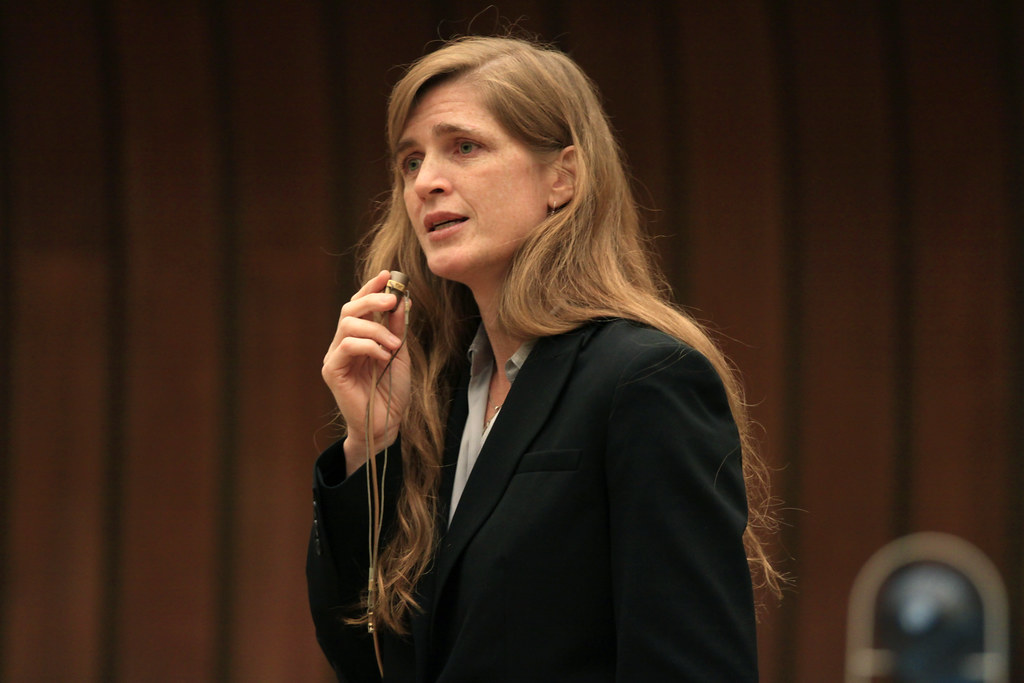On Wednesday, September 25, former U.S. Ambassador to the UN Samantha Power gave a talk to Michigan students and faculty. Presenting as part of the Weiser Diplomacy Series from various foreign policy experts, Power gave thoughtful advice to both the diplomatic community and the college crowd. The lecture, structured around her new book The Education of an Idealist, was rife with personal stories and policy proposals.
When Power thanked Schlissel in her opening remarks, she quipped about addressing him as Mr. President, a term she was used to reserving for Barack Obama. Those times have changed; in her eyes, not for the better.
I was at first apprehensive about listening to former Ambassador Power discuss diplomacy. At Stanford two years ago, I took a summer course called Genocide and Humanitarian Intervention. We covered the history of Genocide from Armenia to South Sudan, often lamenting about how infrequently nations would ascribe the powerful term “Genocide” to mass atrocities.
After taking the course, I felt Samatha Power was part of the reason it is hard for countries to assign the term “genocide” to mass atrocities: it’s such a severe concept, and we can’t rush to attribute it to every brutal regime like she seemed to believe we should. I wondered how my perception of Power would change during this lecture. From what I knew, she was a champion of human rights; her work, however, often came at the expense of U.S. sovereignty. How would she address her human rights initiatives in the context of U.S. diplomacy?
Attempting to connect to the young-at-heart, Power often emphasized the importance of those interested in advocacy or the foreign service to find something specific and fight for it. She hoped to address “those who are feeling a pull to make a difference in the world.” To achieve this herself, Power advocated for policies that the majority of the world could support; she named the #freethe20 movement as an example of effective advocacy in the political sphere.
As Power spoke, I felt myself shed any apprehension I had before the lecture. Although I am far from her political ally, her advice for college students and those in the foreign service was universally applicable and thoughtful.
#freethe20 was a bipartisan campaign, headlined by Power, to help twenty female political prisoners in various nations be released from prison. The campaign was created on the 20th anniversary of the signing of the Beijing Declaration, which promoted the idea that women’s rights are human rights. Power’s advocacy through policy got sixteen of the twenty women out of prison, and is still championing the fight for women’s political rights abroad. This was her modest contribution to positive change, something that she felt she could work to fix in the mess of diplomacy issues facing the world.
As Power spoke, I felt myself shed any apprehension I had before the lecture. Although I am far from her political ally, her advice for college students and those in the foreign service was universally applicable and thoughtful. She alluded to the idea that everyone has a place in the fight for global betterment; achieving lasting peace in the Middle East, working to improve LGBT rights, and advocating for women’s rights are not policy goals that can be achieved by one person.
She also emphasized the need to find a “slice of change” for those who aspire to change the world; Michigan has many such students and faculty, and Power’s push for us to pick our niche battle and fight for the minor political victories. As a female Michigan student with an interest in politics, this declaration and the campaign that followed twenty years later resonate with me. I hope to find my slice of change in domestic policy, perhaps in the environmental or economic sectors.
The most important lesson that I learned from Power was that modest stories drive modest change, and modest change is what makes the world into a better place.
The most important lesson that I learned from Power was that modest stories drive modest change, and modest change is what makes the world into a better place. Power fought for small victories in the global LGBT community, for those who were victims of genocide and ethnic cleansing, and for Ebola victims, to name a few of her slices of change. What will yours be?
